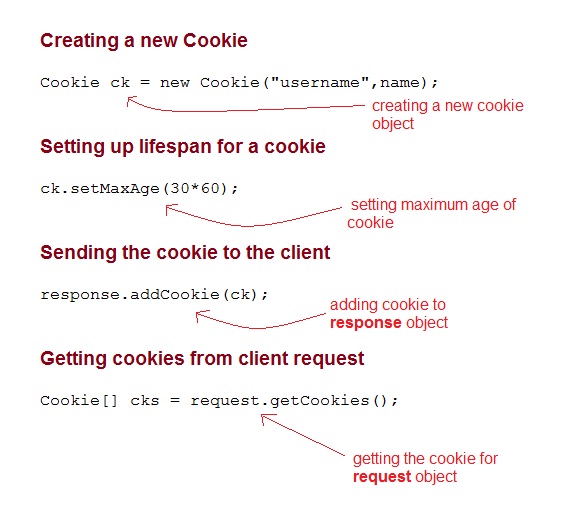Using Cookies for Session Management
Cookies are small pieces of information that are sent in response from the web server to the client. Cookies are the simplest technique used for storing client state.
Cookies are stored on client's computer. They have a lifespan and are destroyed by the client browser at the end of that lifespan.
Using Cookies for storing client state has one shortcoming though, if the client has turned of COokie saving settings in his browser then, client state can never be saved because the browser will not allow the application to store cookies.
Cookies API
Cookies are created using Cookie class present in Servlet API. Cookies are added to response object using the
addCookie() method. This method sends cookie information over the HTTP response stream. getCookies() method is used to access the cookies that are added to response object.Example demonstrating usage of Cookies
Below mentioned files are required for the example:
index.html
<form method="post" action="validate"> Name:<input type="text" name="user" /><br/> Password:<input type="text" name="pass" ><br/> <input type="submit" value="submit"> </form>
web.xml
<web-app...>
<servlet>
<servlet-name>validate</servlet-name>
<servlet-class>MyServlet</servlet-class>
</servlet>
<servlet-mapping>
<servlet-name>validate</servlet-name>
<url-pattern>/validate</url-pattern>
</servlet-mapping>
<servlet>
<servlet-name>First</servlet-name>
<servlet-class>First</servlet-class>
</servlet>
<servlet-mapping>
<servlet-name>First</servlet-name>
<url-pattern>/First</url-pattern>
</servlet-mapping>
<welcome-file-list>
<welcome-file>index.html</welcome-file>
</welcome-file-list>
</web-app>
MyServlet.java
import java.io.*;
import javax.servlet.*;
import javax.servlet.http.*;
public class MyServlet extends HttpServlet {
protected void doPost(HttpServletRequest request, HttpServletResponse response)
throws ServletException, IOException {
response.setContentType("text/html;charset=UTF-8");
String name = request.getParameter("user");
String pass = request.getParameter("pass");
if(pass.equals("1234"))
{
Cookie ck = new Cookie("username",name);
response.addCookie(ck);
response.sendRedirect("First");
}
}
}
First.java
import java.io.*;
import javax.servlet.*;
import javax.servlet.http.*;
public class First extends HttpServlet {
protected void doGet(HttpServletRequest request, HttpServletResponse response)
throws ServletException, IOException {
response.setContentType("text/html;charset=UTF-8");
PrintWriter out = response.getWriter();
Cookie[] cks = request.getCookies();
out.println("Welcome "+cks[0].getValue());
}
}



No comments:
Post a Comment